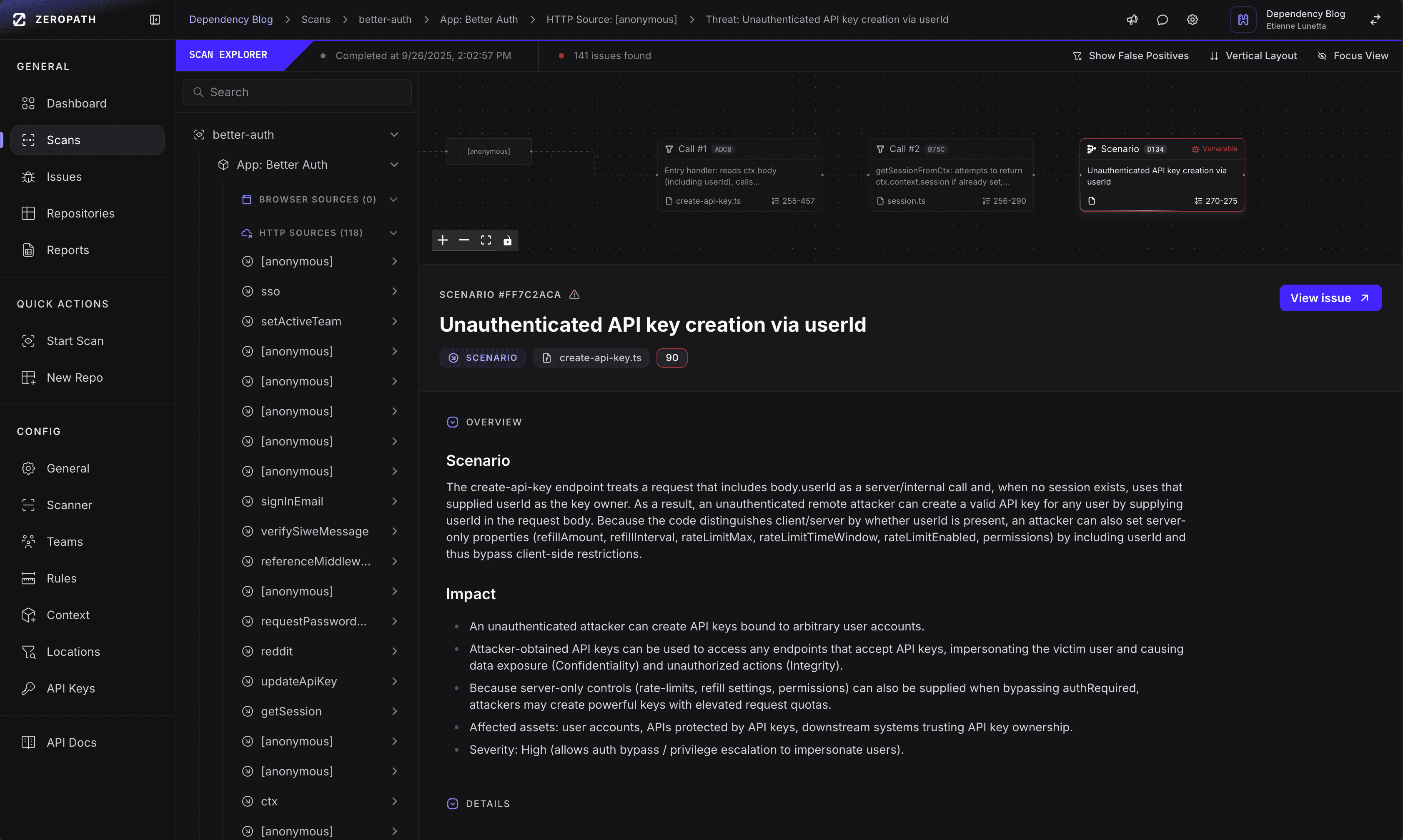Introduction
ZeroPath has uncovered a critical account takeover vulnerability in better-auth's API keys plugin that allows attackers to mint privileged credentials for arbitrary users, affecting a library with ~300,000 weekly npm downloads. Better-auth now powers teams ranging from fast-moving startups to enterprises like Equinor. This post details the vulnerability, exploitation methodology, and our discovery process.
The ZeroPath scanner found this bug while documenting dependency intake workflows for large organizations and building practical guidance for auditing third-party packages. In general, authentication libraries handle one of the most security-critical parts of an application, and issues in those libraries often cascade through every service that depends on them. At large enterprises, packages like these often go through long review processes before inclusion, which made it an ideal candidate for our tests.
Better Auth and the API Keys Plugin
better-auth is a modern authentication framework for TypeScript applications. It uses a plugin architecture to extend functionality, including an API keys plugin that allows applications to generate and manage API keys for authentication. The plugin exposes several endpoints:
/api/auth/api-key/createto mint API keys/api/auth/api-key/updateto modify existing keys/api/auth/api-key/listto list a user's keys
These endpoints are integrated into the authentication flow, but a subtle interaction in their authorization logic introduced an unintended security flaw.
The Vulnerability
Inside createApiKey, the handler derives the user context from the session and request body:
const authRequired = (ctx.request || ctx.headers) && !ctx.body.userId; const user = session?.user ?? (authRequired ? null : { id: ctx.body.userId });
When a request lacks a session but supplies ctx.body.userId, authRequired becomes false. The handler then constructs a user object directly from attacker-controlled input and skips the "server-only" validation branch that rejects privileged fields. The execution path becomes:
- An unauthenticated request includes a chosen
userIdin the JSON body. authRequiredevaluates tofalse, so the handler fabricates a user object using the supplied identifier.- Validation that normally blocks
refillAmount,rateLimitMax,remaining, andpermissionsnever executes. - The database layer receives attacker-controlled values and proceeds with create or update operations for the victim's keys.
Proof of Concept
The behavior is reproducible with a single unauthenticated POST to the create endpoint:
curl -X POST http://localhost:3000/api/auth/api-key/create \ -H 'Content-Type: application/json' \ -d '{ "userId": "victim-user-id", "name": "zeropath" }'
The response yields a valid API key bound to the specified user. Attackers can repeat the sequence for any known or guessable account identifier.
Impact
API keys generally outlive browser sessions and often unlock elevated automation privileges. With CVE-2025-61928, an unauthenticated adversary can mint keys for target users, bypass MFA, and script account takeovers. The issue only affects deployments that enable the API keys plugin, but those installations inherit high-risk exposure.
Mitigation and Detection
Organizations should upgrade to better-auth version 1.3.26 or later, which remediates the flawed authorization check. After patching, rotate any API keys created through the plugin during the exposure window and invalidate unused credentials. Review application and reverse-proxy logs for calls to /api/auth/api-key/create or /api/auth/api-key/update lacking authenticated session cookies, especially where the request body sets userId, rateLimitMax, or permissions values inconsistent with provisioning workflows. If logs surface ambiguous activity, reissue credentials for the affected accounts and monitor subsequent API usage for sign-ins originating from unfamiliar IPs or service tokens.
How ZeroPath Found It
The ZeroPath team scanned better-auth's canary branch on October 1 with the ZeroPath SAST, while building dependency assessment playbooks. Our tooling ingests repositories into tree-sitter ASTs and enriches them into graphs linking call sites, control flow, request schemas, and database interactions.

For this scan, the ZeroPath tool performed its standard repository-wide analysis, including application identification and preliminary threat assessment. During analysis, it identified the API key endpoints and handlers in packages/better-auth/src/plugins/api-key/routes/create-api-key.ts. Dataflow analysis tracked ctx.body.userId through the authentication branch, noted the fabricated user object, and observed that server-only field guards did not run.
ZeroPath's analysis showed how that input flowed into the record that the handler creates:
const data: Omit<ApiKey, "id"> = { /* ... */ userId: user.id, rateLimitMax: rateLimitMax ?? opts.rateLimit.maxRequests ?? null, remaining: remaining === null ? remaining : (remaining ?? refillAmount ?? null), refillAmount: refillAmount ?? null, permissions: permissionsToApply, }; const apiKey = await ctx.context.adapter.create<Omit<ApiKey, "id">, ApiKey>({ model: API_KEY_TABLE_NAME, data, }); return ctx.json({ ...(apiKey as ApiKey), key, metadata: metadata ?? null, permissions: apiKey.permissions ? safeJSONParse(apiKey.permissions) : null, });
The data object inherits the attacker-supplied userId and server-only fields before they're written to the DB and finally returned. The ZeroPath scanner produced similar reasoning for updateApiKey, since it reuses the same authRequired logic.
The vulnerable control flow has been present since the API keys plugin first shipped in better-auth/better-auth#1515, so every release containing the plugin has been susceptible up to version 1.3.26.
Dependency Assessment
This vulnerability emerged while documenting a pragmatic approach to third-party dependency intake. Traditional, scalable vetting processes (checking reputation, GitHub stars, and existing CVEs) and off-the-shelf scanners can't cover business logic issues and implementation-level traps like these. Internal requirements often force companies to fall back to requiring manual review, which quickly becomes impossible to do well at scale.
ZeroPath's opt-in beta workflow extends this capability to third-party dependencies by adding automatic scans during approval and upgrade cycles. Teams that want early access can reach out for onboarding, and the same analysis that surfaced CVE-2025-61928 can enforce custom rules in those dependencies, like ensuring no PII reaches logs.
Better-auth's maintainers responded quickly and shipped a fix shortly after disclosure. We will publish a separate guide on operationalizing these kinds of assessments using ZeroPath.
Timeline
- October 1, 2025 – ZeroPath scanned better-auth 1.3.25 and identified the vulnerability.
- October 2, 2025 – Issue disclosed to the maintainers.
- October 3, 2025 – Patch released in version 1.3.26.
- October 8, 2025 – Advisory published as GHSA-99h5-pjcv-gr6v.
- October 9, 2025 – CVE-2025-61928 assigned.
Disclosure
CVE-2025-61928 is now public via GitHub Security Advisory GHSA-99h5-pjcv-gr6v. ZeroPath coordinated disclosure with the better-auth team and verified the fix. Organizations relying on better-auth's API keys plugin should update to at least version 1.3.26.



